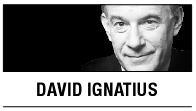WASHINGTON ― Global financial markets depend on trust. So it wasn’t a good sign when Laurence Parisot, the head of the French business federation known as “Medef,” last month charged that reports about the weakness of French banks were an American plot.
“There has been a kind of psychological warfare and an attempt to destabilize the euro area,” an indignant Parisot told Le Figaro on Aug. 28. “Our banks are among the strongest in the world.”

If only France’s problems ― and those of the eurozone as a whole ― were as simple as an Anglo-Saxon conspiracy. Since Parisot’s unfortunate comment, the real weaknesses of French banks have become obvious. Last Tuesday, Moody’s Investors Service downgraded Societe Generale and Credit Agricole, two of France’s biggest banks, and kept a third giant, BNP Paribas, under review.
What’s been scary about this latest chapter of the European financial crisis is that it has revived the panicky “bank run” psychology of September 2008. Big financial institutions have begun to doubt each other, and to mistrust the promises of other banks about what’s on their books. Sadly, this has been especially true of French banks.
The early stages of this bank run (like the machinations of 2008) have mostly been invisible to the public. But since last month, major institutions have been pulling out of the “interbank” market that offers the overnight or short-term loans that keep the system liquid. According to David Smick, a leading global economic strategist, U.S. money-market funds stopped parking their cash with some European banks a few weeks ago. Early this month, the European Central Bank had to take over, in effect, as the interbank lender, Smick says.
As in the 2008 financial crisis, authorities have been issuing daily promises that the system is solvent and has enough liquidity to keep from freezing up. But the eurozone lacks a credible voice of reassurance that’s equivalent to the Fed or the U.S. Treasury. That’s the import of Thursday’s announcement, coordinated with the Fed, that the ECB will allow European banks to borrow dollars. In effect, the U.S. is becoming a provider of liquidity of last resort.
If anyone doubted that America is still the prime mover in the global economy, last week’s moves should be reassuring. The buck stops here, so to speak.
What made global investors so nervous about French banks? Here are some reasons: One veteran analyst estimates that French bank holdings of debt from the shaky economies of Italy and Spain amount to 390 billion euros, or $540 billion at current exchange rates; he reckons that total French claims on the weak or insolvent eurozone periphery countries are 640 billion euros, or $886 billion. The planned euro bailout fund, by comparison, is 440 billion euros, or $609 billion.
One prominent U.S. investor got nervous when he began analyzing the balance sheets of big French banks. He noted that French banks maintain far smaller buffers of capital than do big American banks to protect against loan losses. (One French bank, for example, has a market capitalization roughly a quarter of JPMorgan Chase’s, even though its assets are about the same, at just over $2 trillion.) And analysts fear that the liquidity of some French banks may be about half what was recommended last December by the Bank for International Settlements.
In this climate of suspicion and mistrust, there’s a chance for what Smick calls “deglobalization” ― as investors retreat toward assets and trading partners they know. Here again, the international stature of Fed Chairman Ben Bernanke and Treasury Secretary Tim Geithner helps maintain enough trust to keep a dispersed, global system from freezing up.
To get a handle on the broader problem of Europe, consider this comment made on CNBC by Barry Sternlicht, chief executive of Starwood Capital Group: “Think of Europe as General Motors,” he said. It’s a big industrial giant that has made promises to its unionized workforce that it can’t afford. Each European worker is carrying too many retirees on his back. As with GM, it will take many years to strike a new balance ― to organize what amounts to a managed bankruptcy for the eurozone and the beginnings of a recapitalization.
This past month reminded investors what panic feels like. Much of America’s angst has been focused inward, appropriately enough, on our own economic and political problems. But frankly, the U.S. has it easy compared with Europe, where true stabilization is going to mean rewriting the premises of European unity, and the social contract itself.
By David Ignatius
David Ignatius’ email address is davidignatius@washpost.com ― Ed.
(Washington Post Writers Group)




![[Herald Interview] 'Trump will use tariffs as first line of defense for American manufacturing'](http://res.heraldm.com/phpwas/restmb_idxmake.php?idx=644&simg=/content/image/2024/11/26/20241126050017_0.jpg)

![[Health and care] Getting cancer young: Why cancer isn’t just an older person’s battle](http://res.heraldm.com/phpwas/restmb_idxmake.php?idx=644&simg=/content/image/2024/11/26/20241126050043_0.jpg)

